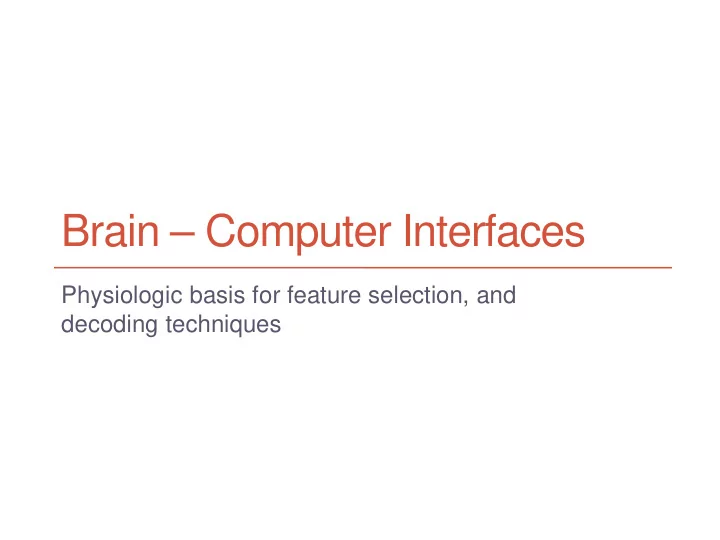

Brain – Computer Interfaces Physiologic basis for feature selection, and decoding techniques
Brain – Computer Interfaces For dexterous motor control Hochberg 2012
Brain – Computer Interfaces Control of end effectors
Brain – Computer Interfaces Control of end effectors Communication
Brain – Computer Interfaces Control of end effectors Communication Neuromodulation to replace lost senses
Brain – Computer Interfaces Control of end effectors Communication Neuromodulation to Other Neuromodulation / Biofeedback replace lost senses
Brain – Computer Interfaces Consumer BCI Control of end effectors Communication Neuromodulation to Other Neuromodulation / Biofeedback replace lost senses
Brain – Computer Interfaces Many Applications -> Many Engineering Requirements -> Many Architecture Considerations
Brain – Computer Interfaces Many Applications -> Many Engineering Requirements -> Many Architecture Considerations But in general: need to isolate , translate , and utilize a neural signal
Brain – Computer Interfaces Many Applications -> Many Engineering Requirements -> Many Architecture Considerations But in general: need to isolate , translate , and utilize a neural signal
Architecture of a BCI Classification / Regression
Architecture of a BCI Classification / Regression
BCI Signal Types Non-invasive EEG (scalp) ECoG (brain surface) Intracortical (Picture credit: Wadsworth Center) Electrodes Invasive
BCI Signal Types Signal Cell count Raw Feature Z Spatial Signal Magnitude (depends) Specificity Stability EEG (non- > 1M ~50 uV 3-5 1-5 cm Long-term? invasive) ECoG 500K ~500 uV 10-20 3-10 mm Months (semi- invasive?) Intracortical 1-??? 10s of mV Very high < 300 um Days (invasive) Appropriate modality choice depends on application. Consider subject population. Research/Clinical goals. Stimulation requirements.
Architecture of a BCI Classification / Regression
Feature extraction, intracortical recordings
Feature extraction, intracortical recordings The quest for single units mean firing rates
Feature extraction, intracortical recordings The quest for single units Ensemble spiking mean firing rates
Feature extraction, intracortical recordings The quest for single units Local Field Potentials (LFPs) Ensemble spiking mean firing rates
Feature extraction, ECoG and LFPs
Feature extraction, ECoG and LFPs Spectral Estimation: STFFT Wavelets Band filtering and envelope detection Auto-regressive model
Feature extraction, EEG Signal spreads as it passes through meat
Feature extraction, EEG Signal spreads as it passes through meat 1) Correct for spatial spreading Common Spatial Patterns – Linear combination of electrodes maximizing two class discriminability
Feature extraction, EEG Signal spreads as it passes through meat 1) Correct for spatial spreading Common Spatial Patterns – Linear combination of electrodes maximizing two class discriminability Use of spherical head model as solution to forward model
Feature extraction, EEG Signal spreads as it passes through meat 1) Correct for spatial spreading Common Spatial Patterns – Linear combination of electrodes maximizing two class discriminability Use of spherical head model as solution to forward model Subject specific MRI as solution to forward model
Feature extraction, EEG Signal spreads as it passes through meat 1) Correct for spatial spreading Common Spatial Patterns – Linear combination of electrodes maximizing two class discriminability Use of spherical head model as solution to forward model Subject specific MRI as solution to forward model 2) Apply same spectral estimation techniques used in ECoG (50 Hz and below) for SMR and SSVEP Or Simple LPF for EPs
Architecture of a BCI Classification / Regression
Decoding, intracortical recordings Translation of neural signal to one or more continuous variables
Decoding, intracortical recordings Translation of neural signal to one or more continuous variables Population Vector − ∑ r r = ˆ 0 d p i r i max i
Decoding, intracortical recordings Translation of neural signal to one or more continuous variables Population Vector Kalman Filter Estimate Update − ∑ r r = ˆ 0 d p i r i max i Bonus: Incorporates effector kinematics
Decoding, intracortical recordings Translation of neural signal to one or more continuous variables Population Vector Kalman Filter Estimate Update − ∑ r r = ˆ 0 d p i r i max i Bonus: Incorporates effector kinematics Many Others: Neural Networks, ARMA Models, etc
Decoding, ECoG Translation of neural signal to one or more continuous variables, High SNR allows (causes ) us to be lazy.
Decoding, ECoG Translation of neural signal to one or more continuous variables, High SNR allows (causes ) us to be lazy. mean std dy/dt = (x-mu) / std
Decoding, EEG Much harder computational problem, because of low SNR Neural signal typically translated to discrete variable with pre-defined (and pre-trained) number of states SVM, Naïve Bayes, Decision Trees, LDA Random Forest, Neural Network, on and on… BCI competition Non-linear transform + LDA
An Inherent Problem
The Underlying Model visual feedback effector position effector decoder effector movement movement target position visual feedback effector effector Inverse position decoder Task goal effector movement model target movement position Separately capable of adaptation
Closed-loop decoder adaptation
Recommend
More recommend